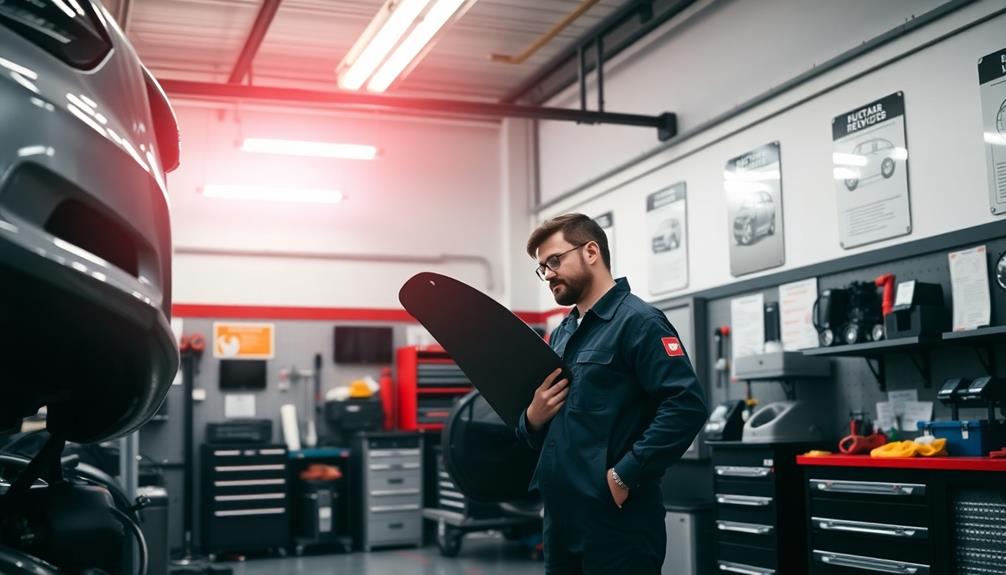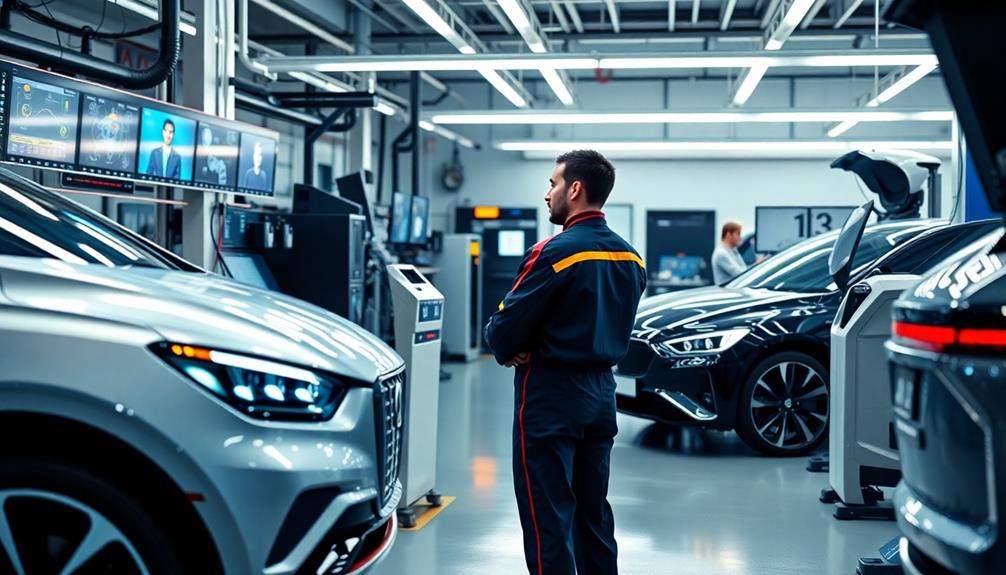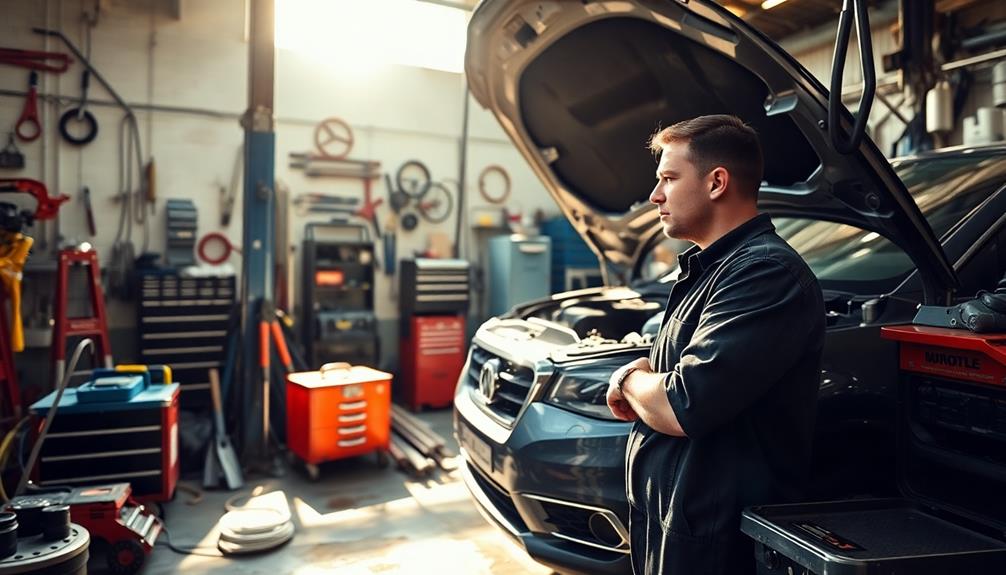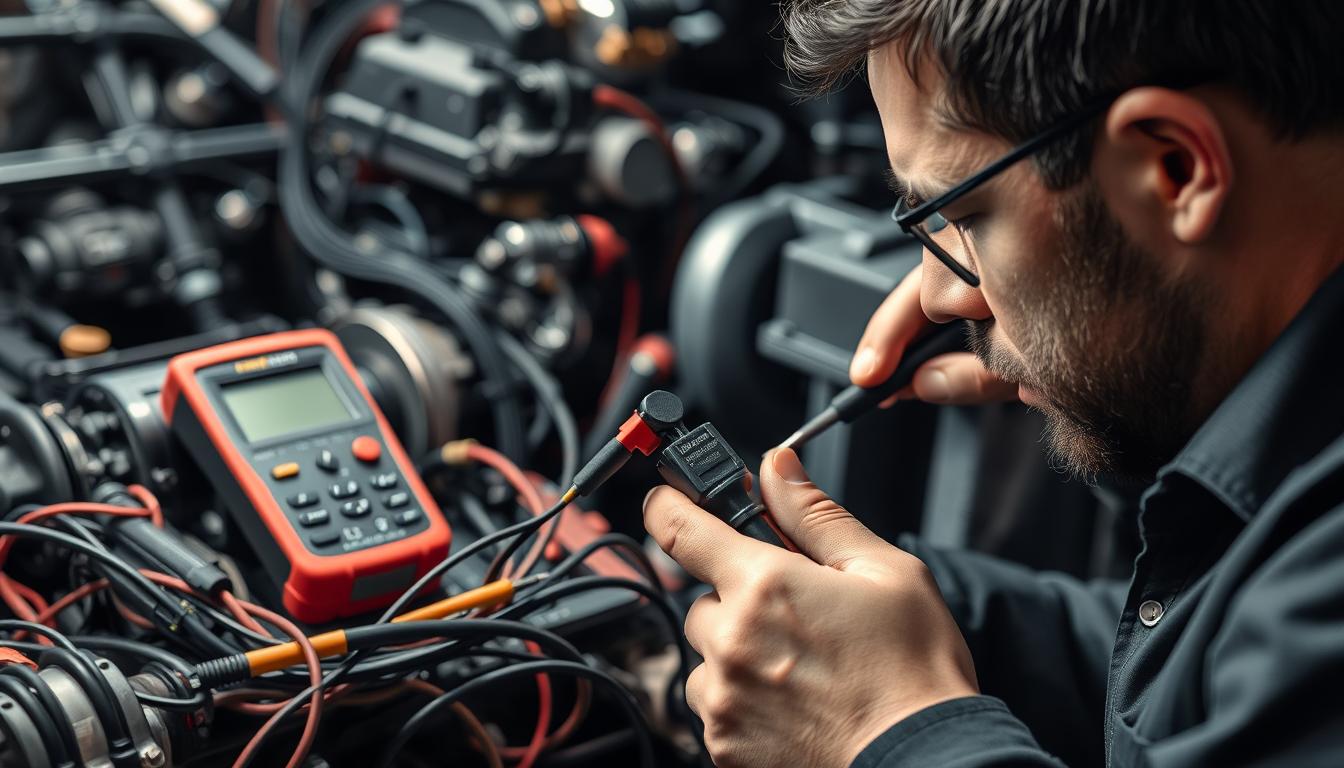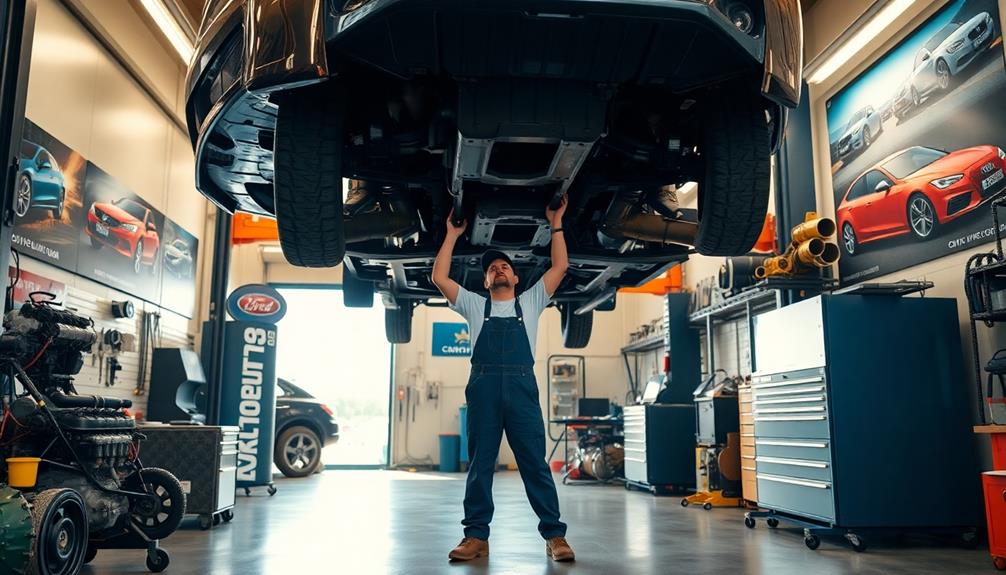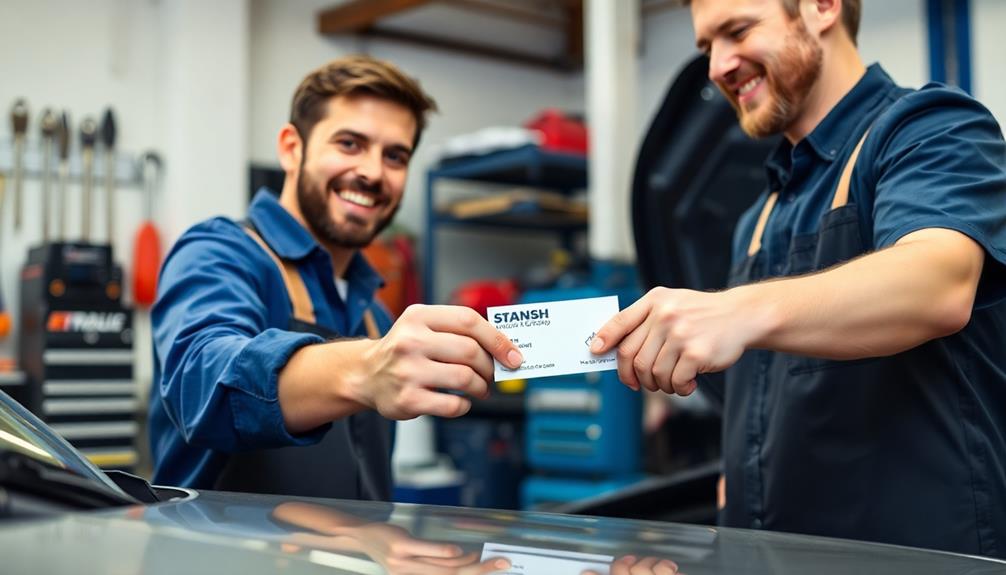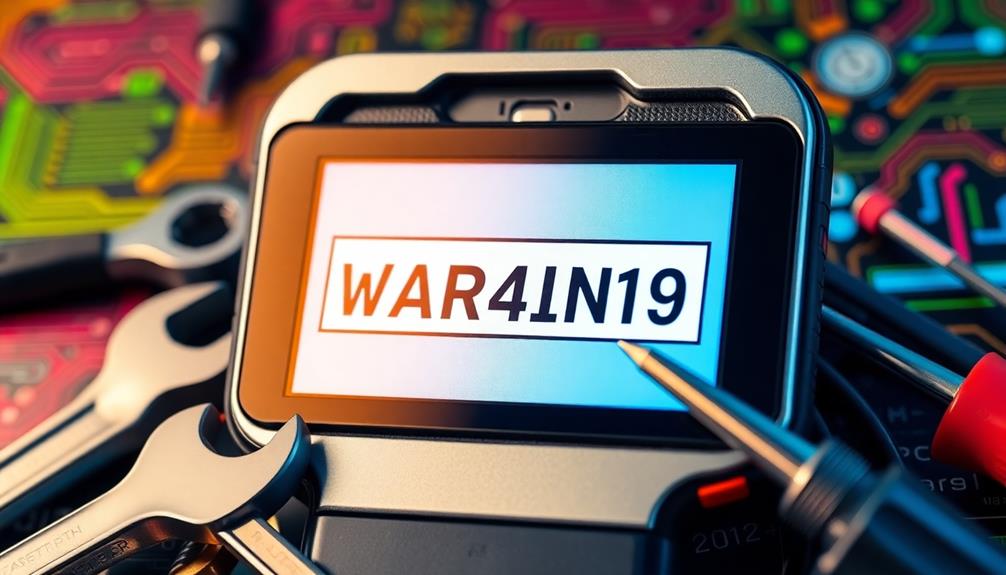The Bureau of Automotive Repair (BAR) is your go-to authority for ensuring safety and quality in the automotive repair industry. Established in 1972, it regulates and licenses repair dealers, enforces high standards, and administers programs like the Smog Check to protect consumers. You're looking at a powerful entity designed to combat fraud and incompetence. The BAR conducts inspections and offers various assistance programs to help vehicle owners. It plays a significant role in maintaining trust and accountability within the industry. If you're curious about its specific programs and impact, there's much more to uncover!
Key Takeaways
- The Bureau of Automotive Repair (BAR) was established in 1972 to protect consumers from fraud in automotive repair services.
- It regulates automotive repair dealers, administers the Smog Check Program, and oversees quality standards in automotive repairs.
- Licensing requires an initial fee, annual renewal, and background checks to ensure compliance with industry regulations.
- BAR conducts unannounced inspections and mandatory annual inspections to maintain high standards and ensure consumer trust.
- It offers consumer assistance programs, including financial help for Smog Check failures and quality inspections for auto body repairs.
Overview of the Bureau

The Bureau of Automotive Repair (BAR) is an important regulatory body established in 1972 to tackle issues of fraud and incompetence in the automotive repair industry. As a consumer, you benefit from BAR's oversight, which serves as the licensing and regulating authority for automotive repair dealers. This guarantees that you receive quality service when you take your vehicle for repairs.
BAR administers crucial programs like the Smog Check Program and the Auto Body Inspection Program, both aimed at enhancing consumer protection. These initiatives not only help maintain the integrity of repairs but also contribute to environmental safety. When you visit a licensed facility, you can feel confident that they adhere to state regulations and standards.
To maintain high standards, BAR mandates criminal background checks for all applicants seeking to obtain or renew a motor vehicle repair license. This requirement helps weed out those unfit for the industry.
Additionally, BAR conducts unannounced inspections of licensed facilities, which guarantees ongoing compliance with licensing regulations and consumer protection standards. With BAR's diligent oversight, you can trust that your automotive repair experience is safe and reliable.
History of the Bureau
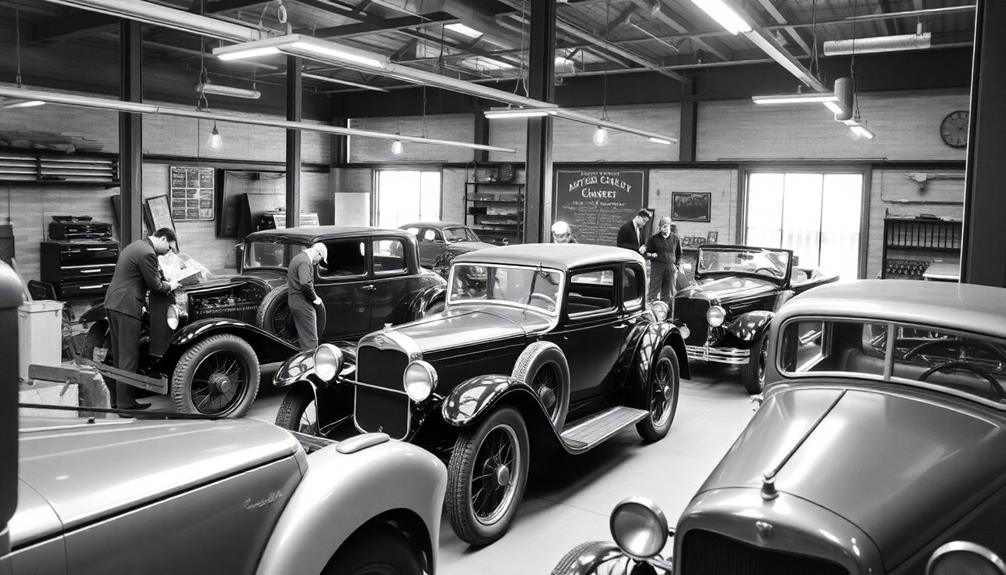
Since its inception in 1972, the Bureau of Automotive Repair (BAR) has played an essential role in addressing fraud and incompetence within the automotive repair industry. Established under the Automotive Repair Act of 1971, the BAR was created to improve consumer protection and guarantee quality standards across California. You'll find that the Bureau's authority extends to licensing and regulating a wide range of automotive repair dealers, along with overseeing lamp and brake inspection services.
In 1984, the BAR took on the responsibility of administering the California Smog Check Program, which was a significant step in enhancing vehicle emissions control. Over the years, the Bureau has evolved to include various consumer assistance programs that support vehicle owners and uphold industry accountability.
Here's a quick overview of the BAR's key milestones:
| Year | Milestone | Description |
|---|---|---|
| 1972 | Establishment | BAR was founded to combat automotive fraud. |
| 1984 | Smog Check Program | BAR became the administrator for emissions control. |
| 1990 | Consumer Assistance Programs | Introduction of programs to aid vehicle owners. |
| 2023 | Ongoing Regulation | Continues to enhance quality in automotive repairs. |
Licensing Requirements
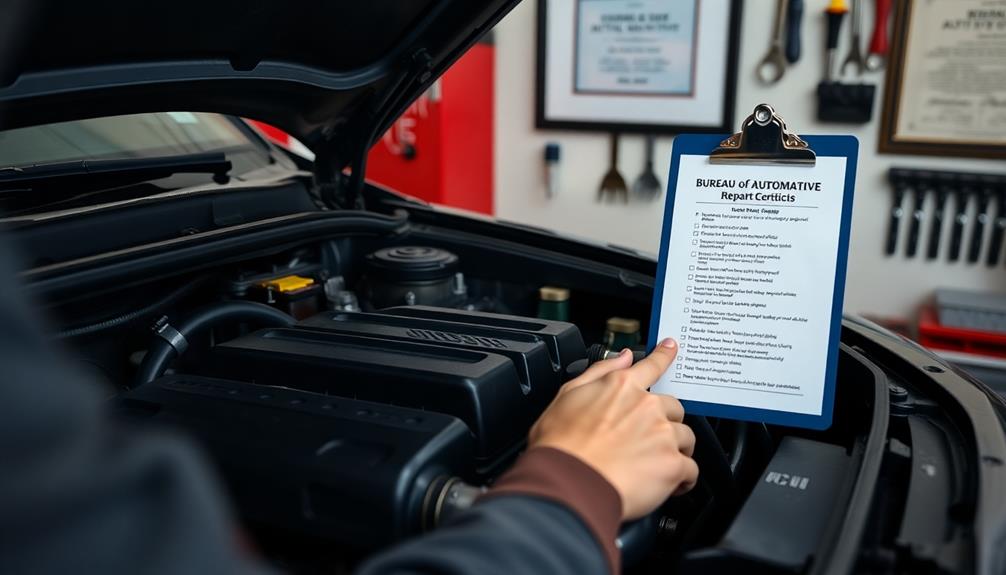
Getting a license is essential for any business involved in motor vehicle or trailer repairs, whether it's a mechanic shop or a body shop.
You'll need to pay an initial license fee of $569.59, and remember, the license must be renewed annually for a fee of $546.34.
To obtain or renew your license, you must undergo a criminal background check. This step is vital, as it guarantees that you meet the industry's standards of integrity.
Along with your application, you'll need to submit several important documents. Be prepared to provide your Certificate of Occupancy and Articles of Incorporation if applicable.
Keep in mind that timely renewal is important. If you fail to renew your license within 30 days of its expiration, you'll have to reapply as a new applicant, which can be a lengthy process.
Making sure that you fulfill all these requirements will help you maintain your business's credibility and compliance with regulations.
Application Process
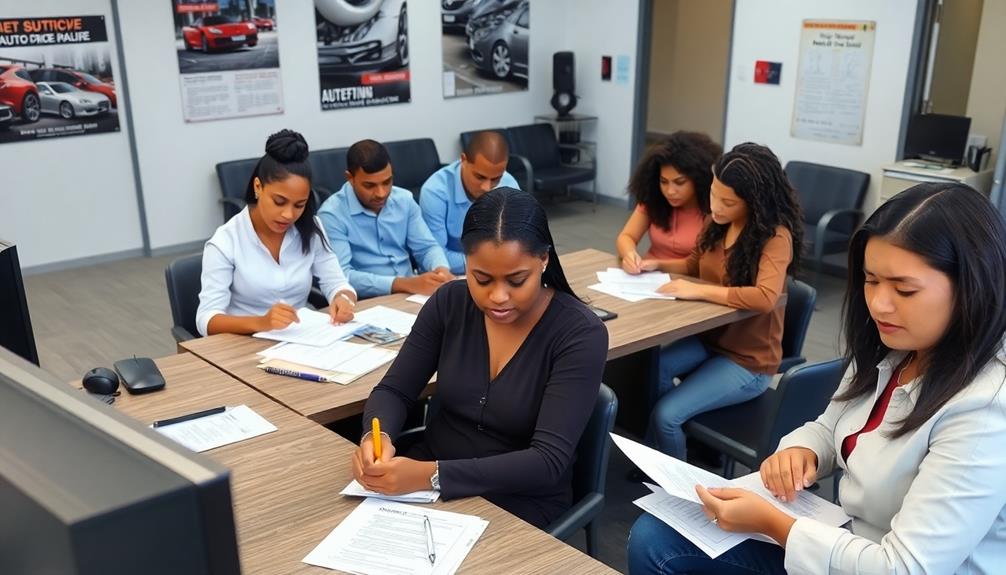
When you're ready to apply for a Bureau of Automotive Repair license, you'll need to gather specific documents, including your Certificate of Occupancy. Additionally, you’ll need to provide proof of compliance with local zoning laws and ensure that your business address matches the one on your application. It’s important to review all the requirements on the official website to avoid delays. For detailed instructions on **how to apply for a BAR license**, be sure to consult the Bureau of Automotive Repair’s application guide and double-check that all submitted documents are accurate and up to date.
Don't forget that a criminal background check is essential, as inaccuracies in your application can cause delays.
Once you have everything in order, you can submit your application either in person or by mail.
License Application Requirements
To apply for a license to operate a motor vehicle or trailer repair business, you'll need to meet several key requirements.
First, be prepared to pay an initial application fee of $569.59. You'll also need to gather and submit necessary documents, including the Certificate of Occupancy and Articles of Incorporation. You can submit these documents either in person or by mail.
A criminal background check is mandatory for all applicants, so make certain that the information you provide is accurate. Inaccuracies can lead to delays in your application process.
Remember that once you receive your license, it must be displayed on the premises at all times.
Be aware that unannounced inspections may occur to make certain compliance with licensing regulations, so stay prepared.
If you're considering renewal, note that invoices are sent 30 to 45 days before your license expires; you can complete the renewal in person or by mail.
However, if you miss the renewal deadline, you must reapply as a new applicant.
Following these requirements carefully will help you successfully navigate the application process and maintain compliance with the Bureau of Automotive Repair.
Renewal Process Steps
How can you secure a smooth renewal process for your automotive repair license? Start by paying close attention to the renewal invoice you receive 30 to 45 days before your license expires. This gives you ample time to gather the necessary documents and make your payment, which you can do via business checks, cashier's checks, money orders, cash, or credit/debit cards in person.
When you're ready, submit your renewal application either in person at the designated office or by mail. Just remember that a criminal background check is mandatory, and providing accurate information is essential to avoid any delays.
If your license expires and you fail to renew it within 30 days, you'll be required to reapply as a new applicant, which means losing the benefits of your previous license.
To keep your permit valid and maintain uninterrupted operation, stay on top of these steps. With careful preparation and timely action, you can navigate the renewal process with ease and continue to run your automotive repair business without interruption.
Background Check Importance
Understanding the importance of a criminal background check in the application process is essential for anyone seeking to obtain or renew their automotive repair license. This check is mandatory, and it helps guarantee compliance with licensing regulations while promoting consumer safety in the automotive repair industry.
When you apply, you must provide accurate information during the background check process. Any discrepancies can lead to delays in your application, which you definitely want to avoid.
If your background check yields a failed result, you'll need to contact the Auto Dealers for further instructions on how to proceed. This step is imperative, as the results considerably impact your ability to acquire or renew your license.
Keep in mind that the Bureau of Automotive Repair conducts these checks to verify your eligibility and maintain high standards within the automotive repair sector. A clean record can smooth your path to obtaining or renewing your license, while any issues could complicate the process.
Background Check Procedures
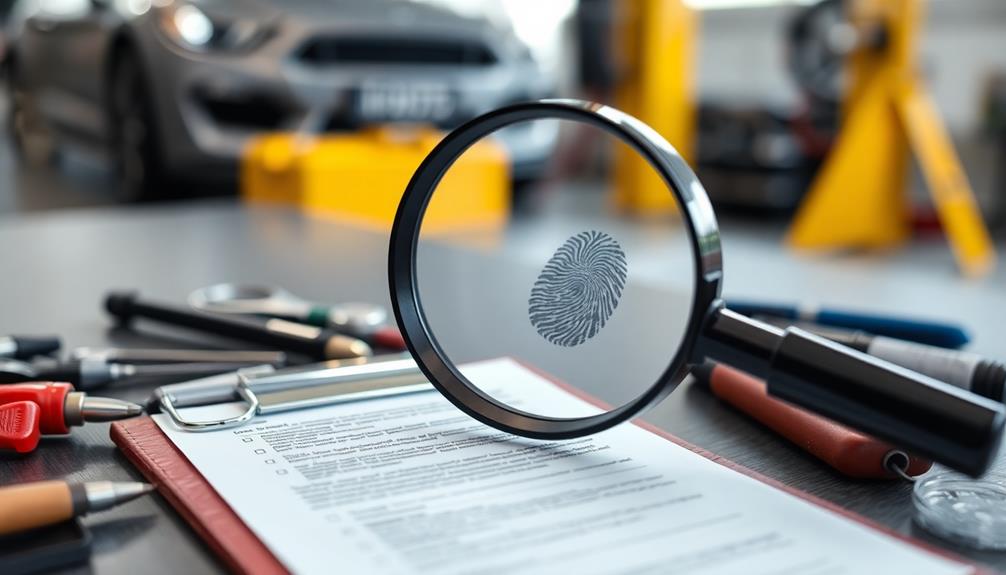
When applying for or renewing a license with the Bureau of Automotive Repair (BAR), you're required to undergo a criminal background check. This process is mandatory for all applicants and plays an essential role in ensuring compliance with licensing regulations.
The accuracy of the information you provide is critical; any discrepancies can lead to delays in processing your application.
Here's what you need to know about the background check procedures:
- Initial Application and Renewal: Background checks are conducted for both new licenses and renewals to maintain consistent oversight.
- Information Accuracy: Make sure the information you submit is accurate to avoid complications later in the process.
- Next Steps if Failing: If your background check fails, you must contact Auto Dealers for further instructions on what to do next.
- Impact on Application: The results of the background check can substantially affect your ability to proceed with obtaining or renewing your license.
Understanding these procedures can help you navigate the licensing process smoothly and avoid potential setbacks.
Compliance and Inspections
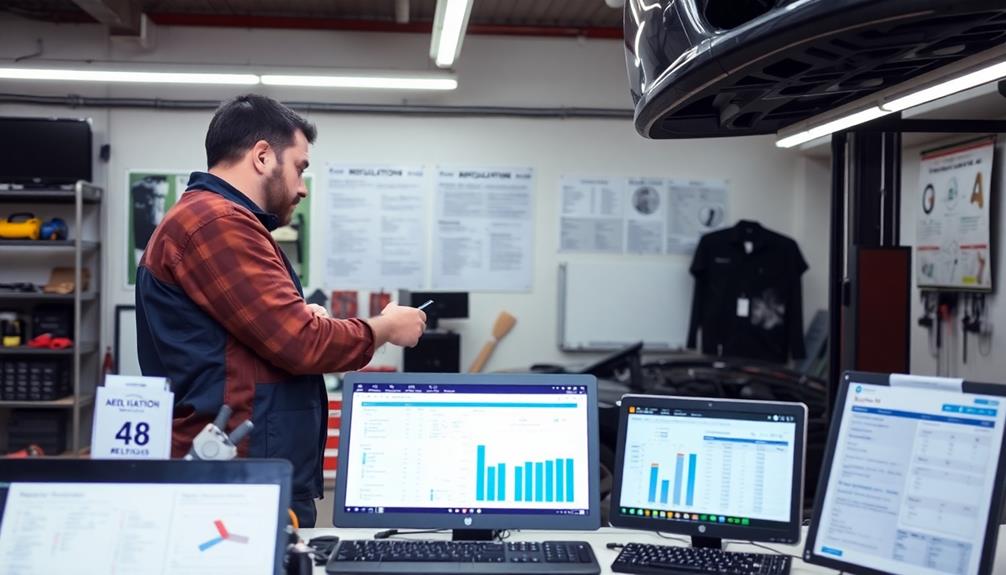
Ensuring compliance with licensing regulations is essential for automotive repair businesses, as the Bureau of Automotive Repair conducts unannounced inspections to uphold these standards.
These inspections help maintain the integrity of the industry and protect consumers from fraud and incompetence. You need to be prepared for the possibility of these inspections at any time, which means maintaining high operational standards consistently.
All licensed automotive repair facilities must display their permit prominently on the premises. This is a condition of compliance, and failing to do so could lead to penalties or even loss of your license.
Remember, inspections can happen without prior notice, so it's imperative to keep your business in top shape every day.
Additionally, you must adhere to the annual inspection requirement. This not only helps you maintain your license but also assures your customers that you're committed to delivering quality service.
The licensing authority has the power to enforce regulations and standards, so staying compliant is essential for your operational legitimacy.
Consumer Assistance Programs
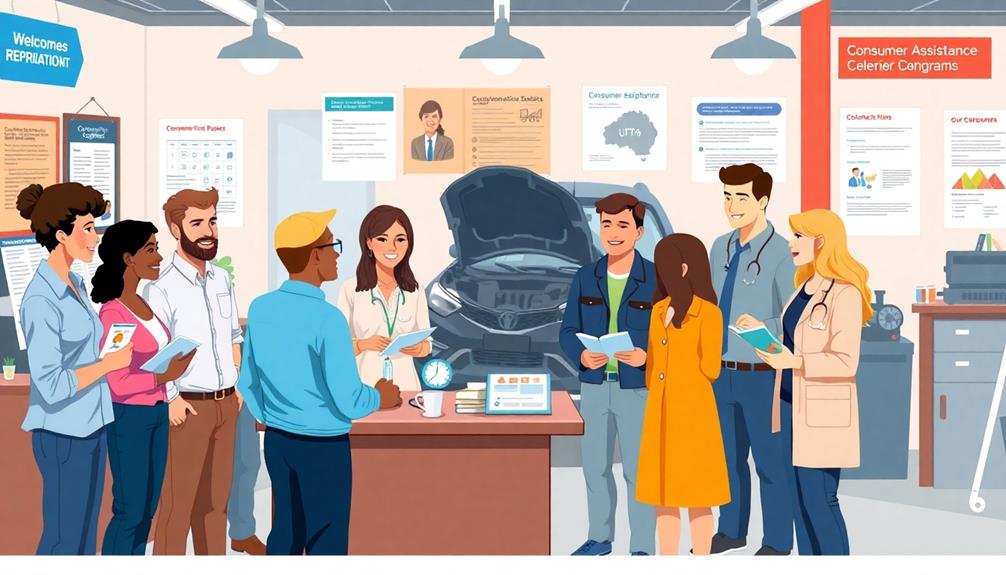
After maintaining compliance with regulations, it's important to know about the resources available to you as a consumer.
The Bureau of Automotive Repair offers several Consumer Assistance Programs (CAP) designed to help you navigate the often complex world of automotive repairs. These programs guarantee you receive quality service and support while promoting environmental compliance.
Here are four key programs you should consider:
- Consumer Assistance Program (CAP): This program provides financial assistance for repairs on vehicles that fail Smog Checks, helping you cover considerable repair costs.
- STAR Program: It certifies automotive repair stations meeting higher performance standards for inspecting high-emitting vehicles, assuring better compliance with environmental regulations.
- Referee Program: If you face disputes related to Smog Checks, this program assists in resolving those issues and conducts inspections for unique vehicles, promoting fairness.
- Auto Body Inspection Program: This offers free inspections to verify the quality of collision repairs, enhancing your trust and safety in the services you receive.
Utilizing these programs can greatly reduce your stress and financial burden when dealing with automotive repairs.
Impact on Automotive Industry
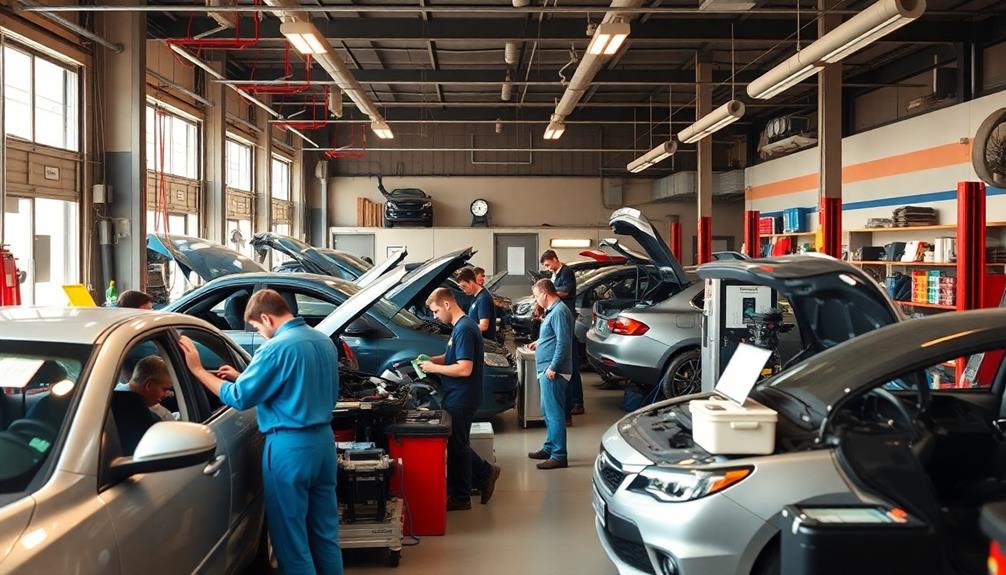
Transforming the automotive repair landscape, the Bureau of Automotive Repair (BAR) plays an essential role in establishing trust and accountability within the industry. By addressing fraud and incompetence, BAR guarantees a regulated environment where consumers can feel confident about the services they receive. This not only protects you as a consumer but also uplifts businesses that follow the rules.
The Smog Check Program is a prime example of BAR's impact. By enforcing emissions standards, it promotes environmental health and helps reduce pollution from vehicles, benefiting everyone in the community.
Programs like the Consumer Assistance Program (CAP) and Auto Body Inspection Program further bolster your confidence by providing repair assistance and verifying the quality of collision repairs.
BAR's licensing requirements and annual inspections hold repair facilities accountable, maintaining high industry standards and safety. When you choose a certified station under the STAR Program, you can trust that they meet higher operational standards.
This encourages excellence among repair dealers, fostering a competitive market focused on quality service. Overall, BAR's efforts enhance consumer protection and elevate the standards of the automotive repair industry, creating a better experience for you.
Frequently Asked Questions
What Does the California Bureau of Automotive Repair Do?
The California Bureau of Automotive Repair guarantees automotive repair dealers comply with state laws. It offers consumer assistance, conducts inspections, resolves disputes, and maintains quality standards, helping you feel confident in your vehicle's repair services.
Is Bureau of Automotive Repair Legit?
Yes, the Bureau of Automotive Repair's legit. It conducts background checks, unannounced inspections, and enforces regulations to guarantee automotive repair businesses meet industry standards. These measures protect consumers and enhance trust in the automotive repair industry.
What Is the Fine for the Bureau of Automotive Repair?
Imagine a red light flashing—it's a warning. Fines from the Bureau can range from hundreds to thousands, based on how serious the violation is. Don't ignore the rules; they can cost you dearly.
Who Regulates Auto Repair Shops in California?
In California, auto repair shops are regulated by the Bureau of Automotive Repair. They guarantee compliance with industry standards, require licenses, and conduct inspections, all aimed at protecting consumers and maintaining quality in automotive services.
Conclusion
In this automotive garden, the Bureau of Automotive Repair acts as a diligent gardener, nurturing the plants of the industry while ensuring they grow strong and healthy. By overseeing licensing, inspections, and compliance, it protects consumers from weeds that threaten their safety. Just as a gardener cultivates a thriving ecosystem, the Bureau cultivates a trustworthy environment for both consumers and businesses. When you support its mission, you're contributing to a flourishing automotive landscape that benefits everyone.
